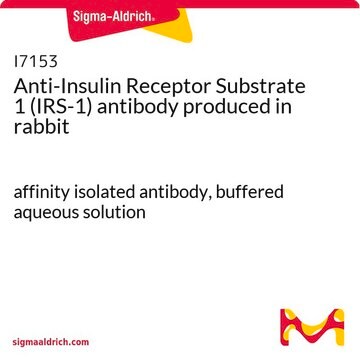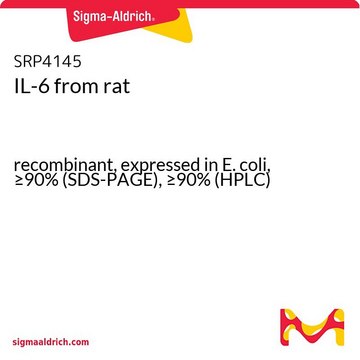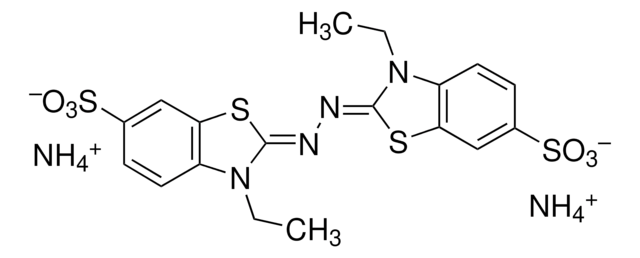I9154
Interleukin-10 from rat
>95% (SDS-PAGE), recombinant, expressed in E. coli, lyophilized powder
Synonyme(s) :
IL-10
Se connecterpour consulter vos tarifs contractuels et ceux de votre entreprise/organisme
About This Item
Produits recommandés
Source biologique
rat
Niveau de qualité
Produit recombinant
expressed in E. coli
Essai
>95% (SDS-PAGE)
Forme
lyophilized powder
Puissance
1-35 ng/mL ED50
Poids mol.
predicted mol wt ~19 kDa
Conditionnement
pkg of 5 μg
Impuretés
endotoxin, tested
Numéro d'accès UniProt
Température de stockage
−20°C
Informations sur le gène
rat ... Il10(25325)
Application
Interleukin-10 (IL-10) from rat has been used to study the anti-allodynic effect of IL-10 in rat model.
Actions biochimiques/physiologiques
Interleukin-10 is an important regulator of the functions of lymphoid and myeloid cells. IL-10 can block the activation of cytokine synthesis and several accessory functions of macrophages. Human and mouse IL-10 share a 73% sequence homology. However, human IL-10 acts on both human and mouse target cells, while mouse IL-10 has species-specific activity. In mouse, the cellular sources of IL-10 consist of Th2 cells, activated fetal thymocytes, macrophages, keratinocytes, LY-1+ (CD5+), and normal B cells. In human, the cellular sources of IL-10 consist of CD4+ T cells and T cell clones, thymocytes, B cells, B cell lymphomas, macrophages, mast cell lines and keratinocytes. IL-10 stimulates the growth of stem cells, mast cells and thymocytes. IL-10 enhances cytotoxic T cell development, and co-stimulates B cell differentiation and Ig secretion. IL-10 regulates angiogenesis by inducing the cell-type dependent expression of either angiogenic or angiostatic factors.
Interleukin-10 regulates lymphoid and myeloid cell functions. It blocks the activation of cytokine synthesis and several accessory functions of macrophages. IL-10 enhances cytotoxic T cell development and co-stimulates B cell differentiation and Ig secretion. IL-10 regulates angiogenesis by inducing cell-type dependent expression of either angiogenic or angiostatic factors.
Forme physique
Lyophilized from a 0.2 μm filtered in 20 mM Tris, 0.1 M sodium chloride containing 50 μg of bovine serum albumin per 1 μg of cytokine.
Remarque sur l'analyse
The biological activity is measured in a cell proliferation assay using the murine mast cell line, MC/9.
Code de la classe de stockage
11 - Combustible Solids
Classe de danger pour l'eau (WGK)
WGK 3
Faites votre choix parmi les versions les plus récentes :
Déjà en possession de ce produit ?
Retrouvez la documentation relative aux produits que vous avez récemment achetés dans la Bibliothèque de documents.
Byung-Sang Lee et al.
Journal of Korean medical science, 28(2), 308-314 (2013-02-13)
We examined the possible anti-inflammatory mechanisms of gabapentin in the attenuation of neuropathic pain and the interaction between the anti-allodynic effects of gabapentin and interleukin-10 (IL-10) expression in a rat model of neuropathic pain. The anti-allodynic effect of intrathecal gabapentin
Justine Durand et al.
Journal of immunology (Baltimore, Md. : 1950), 195(10), 5035-5044 (2015-10-04)
Emerging knowledge regarding B cells in organ transplantation has demonstrated that these cells can no longer be taken as mere generators of deleterious Abs but can also act as beneficial players. We previously demonstrated in a rat model of cardiac
Martina Severa et al.
Journal of interferon & cytokine research : the official journal of the International Society for Interferon and Cytokine Research, 35(9), 668-681 (2015-04-30)
Plasmacytoid dendritic cells (pDCs) display altered immune-phenotype in multiple sclerosis (MS) patients and are found actively recruited in postmortem MS brain lesions, implying that their immune regulation may represent an important aspect of MS pathogenesis. Because of the reported Toll-like
Mohamad Bouhamdan et al.
Cellular signalling, 27(10), 2068-2076 (2015-07-26)
The mitogen activated protein kinases ERK1/2 play an important role in response to toll like receptor (TLR) activation and cytokine production, including IL-10 and IL-12. Here, we examined the role of MEK1 in ERK1/2 activation in response to TLR4 agonist
Yoshiyuki Goto et al.
Scientific reports, 5, 15918-15918 (2015-11-03)
Fucosylated glycans on the surface of epithelial cells (ECs) regulate intestinal homeostasis by serving as attachment receptors and a nutrient source for some species of bacteria. We show here that epithelial fucosylation in the ileum is negatively regulated by IL-10-producing
Notre équipe de scientifiques dispose d'une expérience dans tous les secteurs de la recherche, notamment en sciences de la vie, science des matériaux, synthèse chimique, chromatographie, analyse et dans de nombreux autres domaines..
Contacter notre Service technique






